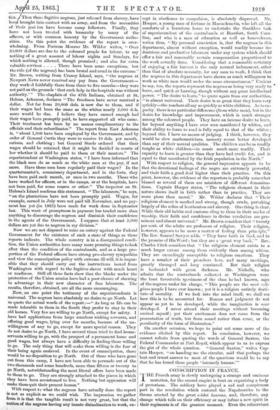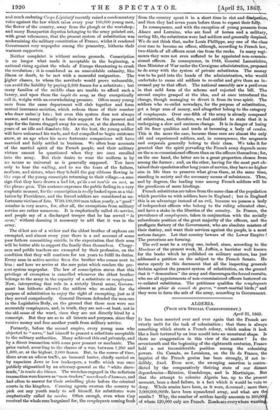CONSCRIPTION IN FRANCE.
rr HE French army is slowly undergoing a strange and ominous I. mutation, for the second empire is bent on organizing a body of pretorians. The soldiery have played a sad and conspicuous part in the revolution which restored the Napoleonides to the throne erected by the great soldat heureux, and, therefore, any change which tells on their efficiency or may infuse a new spirit in their regiments is of the greatest moment. Even the subservient and much enduring Corps Legislatif recently raised a condemnatory voice against the law which takes every year 100,000 young men, the flower of the country, away from the plough or the workshop ; and many Bonapartist deputies belonging to the army pointed out, with great vehemence, that the present system of substitution was undermining the military constitution of France, whilst it rendered Government very unpopular among the peasantry, hitherto their warmest supporters.
Neither complaint is without serious grounds. Conscription is no longer what made it acceptable in the beginning, a national rising against the whole of Europe threatening to crush the revolution ; it is considered as an unavoidable calamity, like illness or death, to be met with a mournful resignation. The higher classes, to whom the servitude would prove unbearable, can avoid the liability by paying 2,500 francs for a substitute ; but many families of the middle class are unable to afford such a luxury, and upon them the impot du sang, as they energetically call it, weighs with an overwhelming pressure. Often many young men from the same department will club together and form mutual insurance societies, which redeem those of their number who draw unlucV lots ; but even this system does not always answer, and many a family see their support for the present and hope for the future dragged away for seven, or, at the shortest, five years of an idle and dissolute life. At the bast, the young soldier will have unlearned his trade, and feel compelled to begin existence anew, at an age when his more fortunate companions will have married and fairly settled in business. We often hear accounts of the martial spirit of the French people, and their military virtues cannot be questioned when they are once enrolled into the army. But their desire to wear the uniform is by no means so universal as is generally supposed. You have only to hear the wailing, and to see the tears of the fathers, mothers, and sisters, when they behold the gay ribbons flowing in the caps of the young conscripts returning to their village—a sure sign that they have drawn a bad lot, qu'ils snit tone,e's an sort, as the phrase goes. This sentence expresses the public feeling in a very emphatic manner, for the conscription is really looked upon as a visi- tation by Providence, and the forced soldiers are considered as un- fortunate victims of fate. With 100,000 men taken yearly, a " good '' number is very scarce, for, after all, the exemptions from military service are rather numerous. It is emphatically called the service, and people say of a discharged trooper that he has served "/.a serve," without deeming it necessary to add that it was in the army.
The eldest son of a widow and the eldest brother of orphans are exempted, and almost every year there is a sad account of some poor fathers committing suicide, in the expectation that their sons will be better able to support the family than themselves. Clergy- men and public teachers are exempted by their profession, on the condition that they will continue for ten years to fulfil its duties. Every man in active service frees the brother who comes next to him ; and here we arrive at the sore point which renders the pre- sent system unpopular. The law of conscription states that this privilege of exemption is cancelled whenever the eldest brother belongs to the army in the capacity of a substitute or remplagant. Now, interpreting that rule in a strictly literal sense, Govern- ment has hitherto allowel the soldiers who re-enlist for the purpose of substitution to enjoy the right of exempting, just as if they served compulsorily. General Daumas defended the measure in the Legislative Body, on the ground that these men were not accurately remplagants, and, in truth, they are not—at least, not in the old sense of the word, since they are not directly hired by a conscript. But they are so to all intents and purposes, since they receive money and free another youth from military service.
Formerly, before the second empire, every young man who objected to "serve," had himself to present a substitute acceptable to the military authorities. Many achieved this end privately, and by a direct transaction with some poor peasant or mechanic. The price varied, according to the chance of a war, between 1,200 and 1,800, or, at the highest, 2,000 francs. But, in the course of time, there arose an odious traffic, an immoral barter, chiefly carried on by rapacious Jews or low innkeepers, a traffic which was once publicly stigmatized by an attorney-general as the "white slave- trade," la traite des Wanes. The wretches engaged in the nefarious transaction were known as "men-traders," marchands d'hommes, and had often to answer for their swindling plots before the criminal courts in the kingdom. Canning agents overran the country to pick out any youth ready to sell himself, for substitutes were emphatically called les marks. Often enough, even when they received the whole sum bargained for, the remplagants coming fresh from the country spent it in a short time in riot and dissipation, and then they had seven years before them to repent their folly.
In consequence, and with the exception of young peasants from Alsace and Lorraine, who are fond of horses and a military, roving life, the substitutes were bad soldiers and generally despised. We do not think that, under Louis Phillippe, any one of the class ever rose to become an officer, although, according to French law, two-thirds of all officers must rise from the ranks. In many regi- ments they were not even suffered to be appointed non-commis- sioned officers. In consequence, in 1848, General Lamoriciere, then Minister of War under the Cavaignac administration, proposed to do away with the system of private substitutes. The money was to be paid into the hands of the administration, who would undertake to cause old soldiers to re-enlist and give them an in- creased pay to that effect. The national assembly saw it peril even in that mild form of the scheme and rejected the bill. The second empire grasped at the idea, and at once introduced the change, though managing to divert it from its true spirit. The soldiers who re-enlist nowadays, for the purpose of substitution, get a large sum of money, and altogether belong to the category of remplagants. Over one-fifth of the army is already composed of substitutes, and, therefore, we feel entitled to state that it is undergoing a slow and ominous change. It is in danger of losing all its finer qualities and tends at becoming a body of vendus. This is the more the case, because these men are almost the only old and experienced soldiers, and, in consequence, the sergeants and corporals generally belong to their class. We take it for granted that the spirit pervading the French army depends more on the non-commissioned officers than on the officers themselves; for, on the one hand, the latter are in a great proportion chosen from among the former ; and, on the other, having for the most part ob- tained their epaulettes after long years of service, they have no higher aim in life than to preserve what gives them, at the same time, standing in society and the necessary means of subsistence. Thus, and by degrees, the leading tone among French soldiers will be the greediness of mere hirelings.
French substitutes are taken from the same class of the population which provides us with soldiers here in England ; but in England this is an advantage instead of an evil, because we possess a body of independent officers who belong to the ruling educated class, and have a stake in the libertiea of the country. In France, the prevalence of temple gents, taken in conjunction with the socially subordinate position of the great majority of the officers, and the profligate flattery of the Government, who are absolute masters of their destiny, and want their services against the people, is a most serious danger. Let that country beware of the Lower Empire ! The pretorians are forming.
The evil must be a crying one, indeed, since, according to the Aloniteur of the present week, M. Joffres, a barrister well known for the books which he published on military matters, has just addressed a petition on the subject to the French Senate. He states openly in this document that all the inspecting generals declaim against the present system of substitution, on the ground that it " demoralizes " the army and discourages the forced recruits, who see all appointments of non-commissioned officers bestowed on re-enlisted substitutes. The petitioner qualifies the remplagants almost as gibier de conseil de guerre, "court-martial birds ;" and they were to form the salt of the army, according to Government.































 Previous page
Previous page